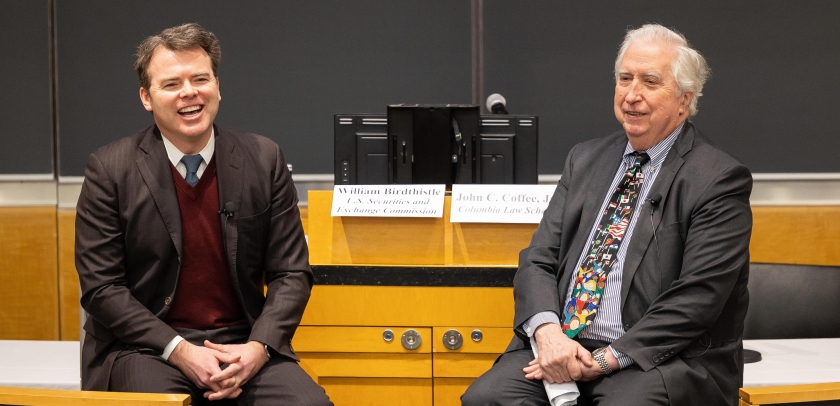Annual Conference Explores Issues in M&A and Corporate Governance
The event, sponsored by the Center on Corporate Governance and the Millstein Center, featured panels on new securities regulation, antitrust enforcement and litigation, cryptocurrency assets, and potential conflicts in controlling shareholder transactions.
Speakers from academia, the judiciary, and the legal and finance industries headlined Columbia Law School’s annual daylong conference on mergers and acquisitions and corporate governance, held in Alfred Lerner Hall on Columbia University’s Morningside campus on Friday, December 8. The event was sponsored by the Center on Corporate Governance, the Ira M. Millstein Center for Global Markets and Corporate Ownership, and the law firms Paul Hastings and Wachtell, Lipton, Rosen & Katz.
Igor Kirman ’96, partner at Wachtell, Lipton, Rosen & Katz and a lecturer in law at Columbia Law School, welcomed conference participants and offered a broad review of the past year in M&A. He noted that even though M&A activity decreased in 2023, merger contracts continued to increase in complexity. “It’s during the dips that our practice evolves the most,” he said.
In contrast, governance issues, including board campaigns by activist shareholders, were extremely active in 2023, Kirman said, citing a campaign by labor groups to win seats on the board of Starbucks.
A keynote conversation between Adjunct Professor of Law Judge Jed S. Rakoff of the U.S. District Court for the Southern District of New York and Eric Talley, Isidor and Seville Sulzbacher Professor of Law and faculty co-director of the Millstein Center, focused on the ethics code newly adopted by the U.S. Supreme Court.
Rakoff called the policy, which reflects much of the code already followed by other members of the federal judiciary, “better than nothing” but noted that the Supreme Court allows individual justices, rather than the court, to decide if they should be recused from a case.
“There are lots of 5 to 4 decisions,” Rakoff said, and if a justice has a conflict but chooses not to recuse, “they can be on the case and make the key decision. I just find that mind-boggling.”
The pair also discussed the difficulty of reconciling conflicting expert testimony from “hired guns,” particularly in cases involving financial valuations. Some court cases have used court-appointed experts, or, outside the U.S., a practice called “hot-tubbing,” in which experts for all parties must work together to arrive at a valuation, Talley said.
Those strategies have yet to be widely used in U.S. courts, Rakoff said. “The U.S. litigation system is so heavily adversarial, much more so than in most countries of the world … the result is you often do have highly qualified people giving very different views. Where it’s a jury trial, there are a lot of studies that suggest that the jury will disregard all the experts. But in a bench trial, of course, we judges have to pay attention.”
Panel discussions with Columbia Law School business and transactional law faculty explored M&A litigation, antitrust enforcement, shareholder activism, new regulation from the Securities and Exchange Commission, and SEC treatment of crypto assets.
Watch panel discussions from the conference:
“Is There MFW Creep? (And, if so, in Which Direction?)”
Moderated by Bloomberg Law reporter Mike Leonard, the opening conference panel featured a discussion of a case pending before the Delaware Supreme Court that involves an important question regarding the appropriate standard of review for transactions between a company and a controlling stockholder where there is a potential conflict of interest. Panelists included Eduardo Gallardo ’99, partner at Paul Hastings; Zohar Goshen, Jerome L. Greene Professor of Transactional Law; Jeroen van Kwawegen ’03, partner at Bernstein Litowitz Berger & Grossmann; Elena C. Norman, partner at Young Conaway Stargatt & Taylor; and Talley.
“The Insecurity of a Security: Crypto Assets and Current Issues in Securities Enforcement and Litigation”
The evolution of the treatment of crypto assets under federal securities laws and other issues in securities enforcement and litigation were explored by Jennifer L. Conn ’95, partner at Paul Hastings; Laura H. Posner, partner at Cohen Milstein Sellers & Toll; Judge Rakoff; and Gregory Strong, partner at DLx Law. The discussion was moderated by Joshua Mitts, David J. Greenwald Professor of Law.
“Effects of New Rule 13D-G Regulations: Wolf Repellent or Entrenchment Fortifier?”
A session led by John C. Coffee Jr., Adolf A. Berle Professor of Law and director of the Center on Corporate Governance, covered recent changes in SEC regulations on securities ownership disclosure. Panelists exploring the changes in Rule 13 D-G included Stephen Fraidin, partner at Cadwalader, Wickersham & Taft; former SEC Commissioner Robert J. Jackson Jr.; and John L. Robinson, partner at Wachtell, Lipton, Rosen & Katz.
“Antitrust M&A Landscape”
Professor of Law Dorothy S. Lund led a discussion on current developments in antitrust law relating to M&A, including the potential impact of M&A transactions on employees. The panel’s commenters were Renata B. Hesse, partner at Sullivan & Cromwell; Christina C. Ma ’12, partner at Wachtell, Lipton, Rosen & Katz; Martin C. Schmalz, chief economist and director of the Office of Economic and Risk Analysis at the Public Company Accounting Oversight Board; and Timothy Wu, Julius Silver Professor of Law, Science and Technology.
